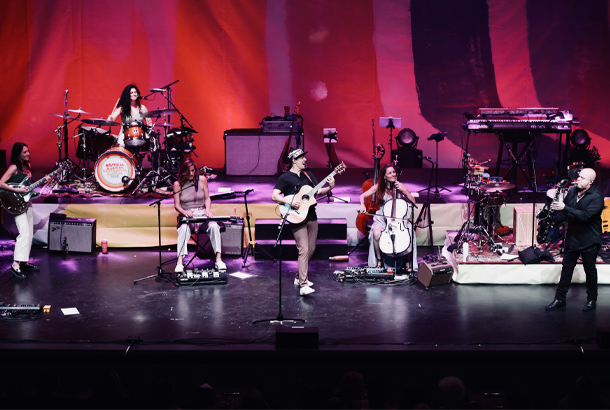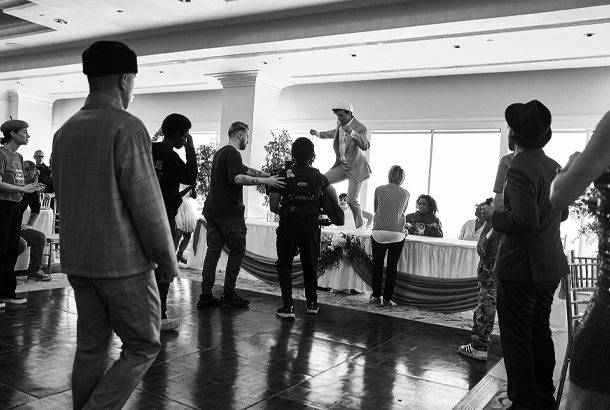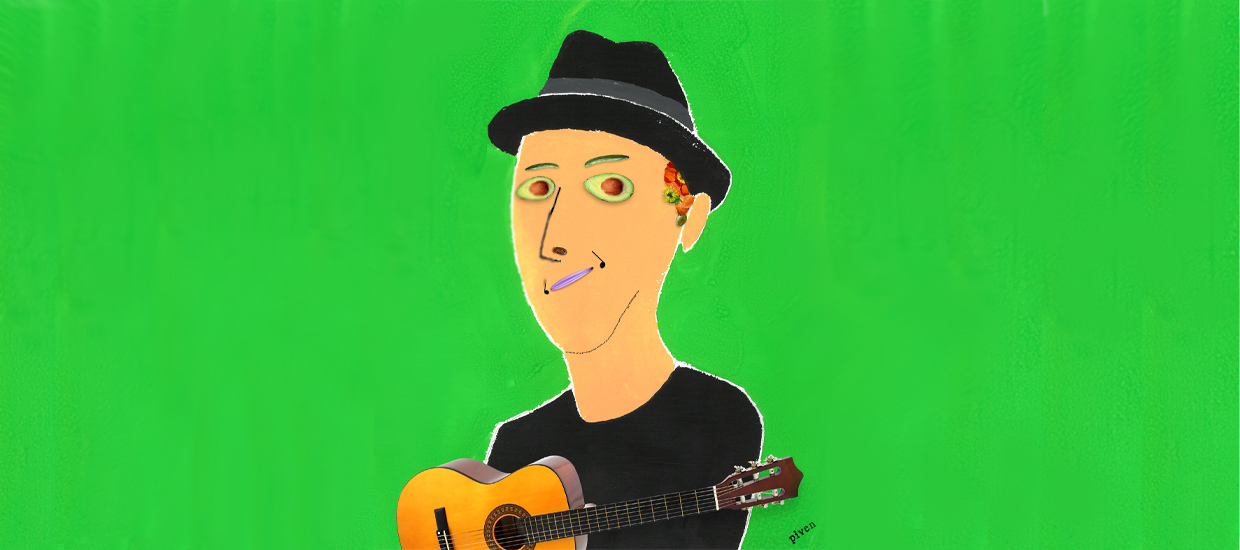The Grammy-winning singer-songwriter returns with a new album, Mystical Magical Rhythmical Radical Ride
After seven albums and two decades in the spotlight, when the pandemic set in singer-songwriter Jason Mraz had decided it was time to hang up his (trademark) hat. “I was ready, honestly, to say I’ve done enough,” he says on a Zoom call from his home in Oceanside, California. “The songs that I have out there are great, and I can just move on and tend my garden and stay out of the limelight for the rest of my days.”
Despite taking a step back, Mraz would still occasionally jam with his longtime collaborators, the rock-folk group Raining Jane, as a way to deal with personal struggles, including the emotional challenges of the pandemic. “Music’s always been my medicine for whatever I’m going through in life,” he says. “The music, lyrics, and maybe even chords will reflect my mood and be a way for me to process whatever it is that’s weighing the most heavily on my mind.”

Eventually this “therapeutic” experience led to a library of songs that he and the members of Raining Jane agreed needed to be shared. Mystical Magical Rhythmical Radical Ride, which is set to be released on June 23 (Mraz’s 46th birthday), is, according to the artist, a “musical adventure through time, singing about the joys of letting go and dancing, the joys of self-expression, the joys of connectivity, even while feeling alone.” The experience of making the album has given Mraz a renewed outlook on music—and life. “Approaching midlife, the irony is that we still have our youth,” he says. “We think we can’t do these childish things anymore, but I think the older we get the more time we start to carve out for ourselves to do the things that we love to do.”
You looked at this eighth album rather symbolically, seeing the “8” as an infinity sign. How did that set the tone?
I just started to feel like, OK, I’m mid-40s and I’m still doing the same thing I did in my early 20s and in my late teens, so not much has changed—and that is a real gift. I succeeded in being able to live my dream and get to do what I want to do with my life. Yet it’s very challenging gathering one’s composure, and dare I say ego, to think, Why am I important enough to still be doing this and capture people’s attention? There’s a billion songs out there—what makes ours any better? I’ve been here before—why am I doing it again? That was a constant driving, nagging energy behind this record. So you end up with songs like “Getting Started” and “If You Think You’ve Seen It All,” the bookends of the album, which are kind of about that infinite loop. It’s like every time I finish a path, finish an album, finish a tour, I usually find myself right back where I started, which is a clean slate. What does an artist do but want to fill that slate again? So I’ve been looking at this album as a full [circle], because I am back around to where I’ve been before, and I’m also back around colleagues, writers, and producers that I’ve worked with for many years, but with a different perspective. We’ve lived through a pandemic. We’re all older. You have kind of a different drive. We’re doing this out of love more than any other need.

The album’s lead single, “I Feel Like Dancing,” is about letting go—and the video really captures that. What were you holding onto that you needed to loosen up about?
I think I’ve just been pretty stiff. Anytime the cameras are around or when you’re on stage, you can’t help having that feeling of being stared at and being observed, and you behave a little differently. I’ve probably sometimes behaved badly, but I think most of the time I’ve behaved quite shyly. “I Feel Like Dancing” really was the medicine that I needed that helped me out of my shell and made me realize, Look, I’m not going to dance like Bieber or Timberlake or any of my pop heroes out there right now, but I dance the way I dance, and that should be OK. I dance differently every time I dance, so for the music video I hired a choreographer who helped me reel it in and control my steps so that the director, the other cast members, and the cameraman could trust that they would know where I’m at. Because without a choreographer I would be flapping my wings and just flying all over the place, like Gene Kelly on mushrooms or something.
In 2018, you came out as bisexual. How has that affected your life and your music?
It was a little challenging at first, because what I realized was I wasn’t being fully true to myself, because—no fault of my own—I hadn’t really had the experiences. It was more of an intuition and a curiosity. Through experiences, I then realized that I spent most of my life chasing an idea of what I thought was a societal norm that would please my family or the picture-perfect description of a relationship. Once I realized that I was chasing something that was not true to my heart, I put the brakes on a lot of things going on in my life and reset. It was very scary and very hard to do, but it’s been so fulfilling and liberating. That freedom is how I can land on a song like “I Feel like Dancing,” because [it relieves] that stiffness, that shyness, that sense of being observed where I need to look good, feel good, do the right thing, say the right things, be kind, all of that. I could still be kind, I can still do all the right things, but also it’s OK if I do it in a way that maybe isn’t the cultural norm. Maybe I can let my freak flag fly a little bit. So, I’m a little bit of a late bloomer and I probably broke some hearts along the way, but I’m excited about this new chapter of my life, and I’m excited that music is the medium through which I get to fly, because if I do that truthfully, then everything else in my life just falls into place.
This album was mostly recorded in New York City. How did the city’s spirit affect the energy of the album?
We knew we needed to get outside of our comfort zone. We wrote a lot of the album in Oceanside or out in Ojai or Yucca Valley. Our music was sounding low-key and peaceful and earthy, and we knew that it needed to have a lot more energy to it. Martin Terefe, who produced [my 2008 album] We Sing. We Dance. We Steal Things., had just built a studio in New York City, so I asked if we could crash. We gave ourselves 10 days, walking the streets with that fast-paced New York life, drinking the coffee, grabbing the smoothie, looking at all the cute dogs, cool fashion, fast cars, crazy smells… New York picked us up and turned us upside down and shook us out, emptied all of our pockets. We showed up to New York prepared, but when we got to New York, we got to throw everything away like we were just fresh artists, naked and afraid.
What’s your favorite part of life in the city?
I went to college in New York for two semesters in 1995. I took my Rollerblades and used to skate all over the city. I would go to Central Park and Times Square, to the arcades they used to have, since I was too young for the bars. I would be a messenger for other students—it was just something I loved to do. When I go back, I take my roller skates. That’s my rush. I love the taxis, the people, and the smoke coming out of the potholes. It’s an immersive experience in what feels like a virtual world.
While this album feels light, you were dealing with a lot of sadness when you were making it, including your stepfather passing away and your mom falling ill. How did all of that impact you?
We had laid down all the basics in New York, and then, sadly, on the last day, I got the call that my stepfather had unfortunately passed in an accident. So I went home and put the album on hold for a couple of weeks. My stepdad was a musician and a huge influence on my musical life—sad that he never got to hear this album. I went back to California to start the album again, and then got the call that my mom was diagnosed with cancer, so I went back to Virginia again. My mom really needed a cheerleader, and suddenly this little pop album really had even more purpose. Honoring the music my stepfather gave me and the love my mom has continued to give us became the driving force to finish this album and make it as sweet and beautiful as it could possibly be. She’s on the mend now—she’s on her last few weeks of chemo.
How does it feel going back to your hometown of Mechanicsville, Virginia?
It’s the same as it was when I was a kid, but with a couple more traffic lights. It’s the kind of place where there’s a central pharmacy, the Mechanicsville Drug Store, with a diner counter where people hang out in the morning and have their breakfast. When my mom was going through her ordeal, I was always at this pharmacy picking up stuff for her, so I was running into the gossip center of town. For me to be in this drug store where my stepfather used to hang out—in fact, I’m pretty sure he still has a tab that I need to settle there—running into people from high school, was really trippy. I don’t have children; I’m not married anymore. I’m very much still like I was when I graduated high school, which is awesome in some ways. Going back home makes me feel grateful for the crazy life that I get to live.
Speaking of the life you’re living, you also own Mraz Family Farms, where you grow avocados, passion fruit, coffee, and more. How did that happen?
A happy accident. I didn’t pursue farming. I just was looking to buy a home where I could have a little studio, where my band could live when we’re between tours. So I found a home on the outskirts of San Diego, surrounded by avocado trees. Shortly after moving in, I realized if I want these fruits to continue to drop from these trees, I have to water, feed, and prune them. That introduced me to the farmer’s schedule and routines. After some years of putting a lot of energy into avocados, I realized I could do the same thing with a guava tree and with cherimoyas, loquats, sapotes, and exotic fruits, all of which are grown in Southern California. So I started to interplant exotic fruits inside the avocado trees. Twenty years later, we’re sitting on a dense fruit forest, all thanks to having had a few avocados here when I moved in.
You’re touring in support of the new record this summer. How has it been getting back out there after the pandemic pause?
We toured in 2021 and 2022, and I found that the audiences really wanted to be there. There was that feeling of not knowing if we’d ever do this again, so it feels even more special than it ever was. An audience member is giving us their time and attention—they’re organizing to get out of the house and come and stand with thousands of people to hear these songs. It’s such an honor and privilege, so I put even more love into it than I ever have, to weave together a show to get into your heart and get you moving in your body so that you really enjoy the day out at the concert. I feel like a yoga teacher: Welcome to the next 90 minutes of your life. Let’s all take a deep breath together. It feels really important.




